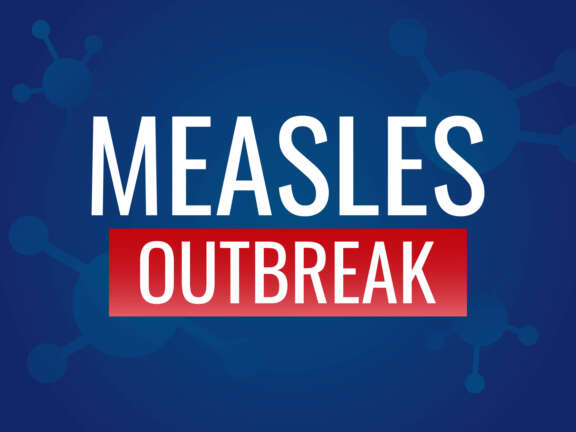Measles: Protect Yourself and Your Community


The measles outbreak that started in Texas has now spread to several other states. It is a serious public health concern. Measles is a virus that spreads very easily through coughing, sneezing, and close contact. It is a very dangerous disease, especially for babies and young children.
Symptoms
It usually takes 7 to 14 days for symptoms to show. First symptoms include:
- High fever
- Cough
- Runny nose
- Red, watery eyes
A couple days later, tiny white spots (called Koplik spots) may appear inside the mouth.
About 3 to 5 days after the first symptoms begin, the measles rash appears. It usually begins as flat red spots on the face at the hairline. The spots then spread down the body. They can appear on the neck, arms, trunk, legs, and feet.
When the rash shows up, the fever can spike extremely high—in some cases over 104ºF.
Complications
Common complications from measles are ear infections and diarrhea. More serious complications include pneumonia, encephalitis (brain swelling), and even death. Those at highest risk for severe complications are young children, pregnant women, and people with weakened immune systems.
Prevention is Key
The Measles, Mumps, and Rubella (MMR) vaccine is your best protection. The CDC recommends:
- First dose at 12-15 months
- Second dose at 4-6 years
Adults who are unsure if they have gotten this vaccine should talk to their health care provider. It is generally recommended that adults get at least one dose of the MMR vaccine if they:
- Were born after 1957 and have not had measles
- Do not have documentation of MMR vaccination
What to Do If You Have Symptoms
If you experience measles symptoms or have been exposed, stay home. Contact your health care provider before visiting the clinic to prevent further spread.
Seek emergency care if you or your child have:
- Trouble breathing
- Seizures
- Confusion
- Signs of severe dehydration
Stop the Spread
- Ensure you and your family are up to date on vaccinations.
- Wash your hands.
- Avoid sick people.
- Don’t share drinks or utensils.
- Disinfect surfaces that are touched often, such as handles and doorknobs.
Frequently Asked Questions About Measles
Below, Innovista Medical Center medical director Afreen Pappa, MD, answers some of the most frequently asked questions about measles, risk factors, and immunity.
I had the MMR vaccine as a child. Am I protected against measles?
The CDC considers you protected from measles if you got two doses of measles-containing vaccine given on or after the first birthday and at least 28 days apart. You are also protected if:
- A lab confirmed that you had measles at some point in your life.
- A lab confirmed that you are immune to measles.
- You were born before 1957.
Do vaccinated people need a booster?
Most people do not need a booster. But in outbreak settings or for international travelers, a health care provider may recommend an additional dose.
I don’t know if I got the MMR series. What should I do?
According to the CDC, you should first try to find your vaccination records or documentation of measles immunity. If you do not have records, you should get the MMR shot. Another option is to get a blood test to see if you are immune.
How effective is the measles vaccine?
Two doses of the measles vaccine are about 97% effective at preventing measles. One dose is about 93% effective.
Could I still get measles if I am fully vaccinated?
According to the CDC, about three people out of 100 who are fully vaccinated against measles will still get the disease. It could be that their immune systems didn’t respond as well as they should have to the vaccine. Fully vaccinated people who get measles seem to have milder symptoms. They are also less likely to spread the virus.
What should I do if I have been exposed to someone who has measles?
Call your health care provider. If you are not immune, the MMR vaccine or a medicine called immune globulin may help reduce your risk of developing measles.
Will the United States ever get rid of measles completely?
Due to a robust vaccination program that started in 1963, measles was officially declared eliminated in the US in the year 2000. This means there was no transmission for 12 months. However, vaccination rates have declined across the country during the past 20 years. As a result, we have seen an increasing number of measles cases.
Travel makes it easy for unvaccinated people to contract measles and spread the illness both abroad and at home. Vaccination is critical to contain and get rid of measles worldwide.
